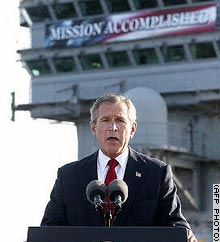Tons Of Iraq Explosives Missing
Material could be used as nuclear trigger
CNN) -- Some 380 tons of explosives powerful enough to detonate nuclear warheads are missing from a former Iraqi military facility that was supposed to be under American control, the U.N.'s nuclear watchdog says.The interim Iraqi government reported several days ago that the explosives were missing from the Al Qaqaa complex, south of Baghdad.
The explosives -- considered powerful enough to demolish buildings or detonate nuclear warheads -- were under IAEA control until the U.S.-led invasion of Iraq in March 2003. IAEA workers left the country before the fighting began.
She described Al Qaqaa as "massive" and said it is one of the most well-known storage sites. Besides the 380 tons, there were large caches of artillery there.
The discovery was not made public sooner because standard intelligence practice is not to let enemies know such information, said a senior administration official.
There are hundreds of tons of other weapons and munitions missing around the country, and it is impossible for the United States to track down all of them, the official said.
A European diplomat told The New York Times that Mohamed ElBaradei, director general of the IAEA, is "extremely concerned" about the potentially "devastating consequences" of the vanished stockpile.
The Iraqi letter to IAEA identified the vanished explosives as containing 194.7 metric tons of HMX, or "high melting point explosive," 141.2 metric tons of RDX, or "rapid detonation explosive," among other designations, and 5.8 metric tons of PETN, or "pentaerythritol tetranitrate."
Fleming said the IAEA, whose mission is to keep track of everything with potential nuclear weapons applications, had been monitoring about 100 sites in Iraq, but there were only a few of special concern, including Al Qaqaa .
"The concern is that other sites that have items that are potentially dangerous have gone missing," Fleming added.
The senior administration official downplayed the importance of the missing explosives, describing them as dangerous material but "stuff you can buy anywhere." The official added that the administration did not see this necessarily as a "proliferation risk."
"In the grand scheme -- and on a grand scale -- there are hundreds of tons of weapons, munitions, artillery, explosives that are unaccounted for in Iraq," the official said. "And like the Pentagon has said, there is really no way the U.S. military could safeguard all of these weapons depots or find all of these missing materials."
------------------------------------
April 29, 2003:
A Reality Check for the Rumsfeld Doctrine
Will Donald Rumsfeld, the US secretary of defence who has just led a war to remake Iraq, now turn his sights closer to home and remake the US military?Mr Rumsfeld is now so powerful and his concept of future warfare is so well validated that he will overcome domestic opposition and at last prepare America's armed forces for 21st-century warfare. Proponents of this view pour on the accolades for Mr Rumsfeld: he is the most influential cabinet secretary since Kissinger, the strongest defence secretary since McNamara, the most creative battle strategist since MacArthur, the most refreshingly blunt politician since Churchill. They also suggest that the doctrine of overwhelming force espoused by Colin Powell, secretary of state, will soon be replaced by a new Rumsfeld doctrine emphasising high technology, special operations units and sheer brainpower to defeat future foes.
------------------------------------
APRIL 26, 2004:
IT'S TIME TO SHELVE THE RUMSFELD DOCTRINE
Too few soldiers and no exit plan have led to upheaval in Iraq
Denial is rampant in Washington. There is denial that intelligence mistakes were made in the months and years before September 11. There is denial that foreign policy mistakes were made in the runup to the war in Iraq. There is denial that the Shiite revolts mark a turning point in the postwar occupation. And most importantly, there is denial that the military strategy going into Iraq, the Rumsfeld Doctrine, is a failure. The best hope left of establishing a stable Iraqi democracy is to replace that doctrine, which emphasizes small, light, and fast military operations, with its rival, the Powell Doctrine, devised by then Chairman of the Joint Chiefs of Staff Colin Powell. The Powell Doctrine calls for overwhelming force shaped by very clear political goals and a specific exit strategy, two things lacking today in Iraq. The failure of the Rumsfeld Doctrine in Iraq is all too clear -- too few boots on the ground, too little legitimacy for America and its handpicked Governing Council, too many shifting goals, and no clear exit strategy. The result in recent weeks has been a cycle of kidnappings, ambushes, counterstrikes, death, and destruction that increasingly echoes the disaster in Vietnam.
------------------------------------
Misson Accomplished!
